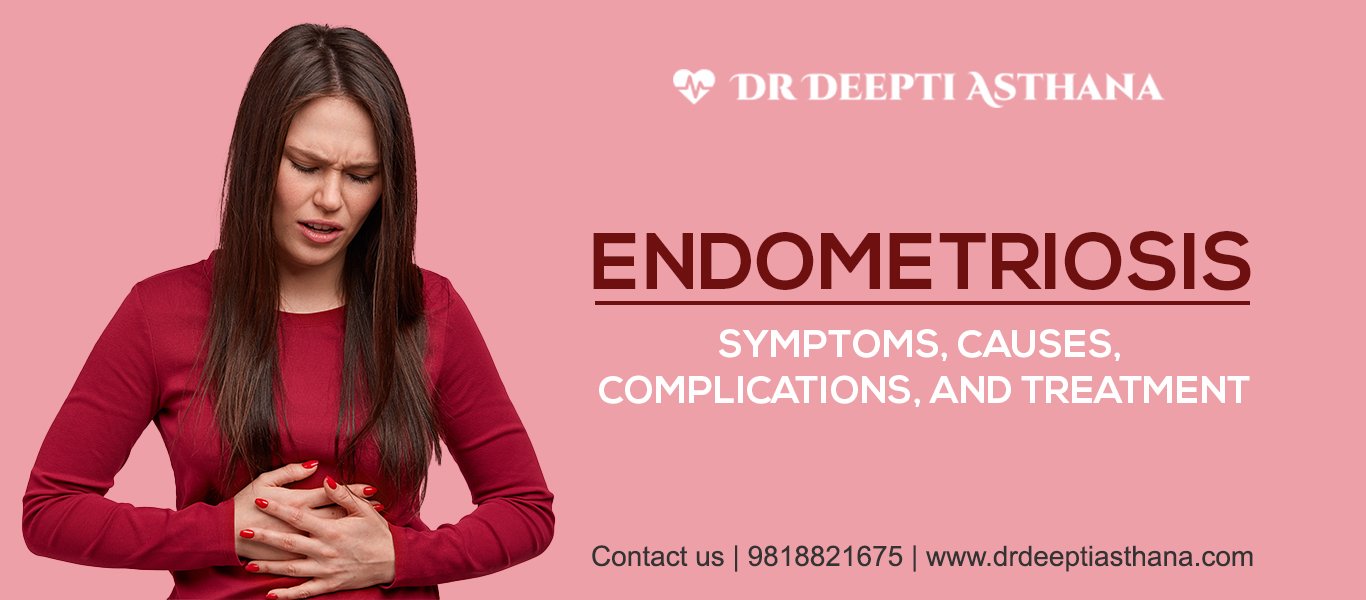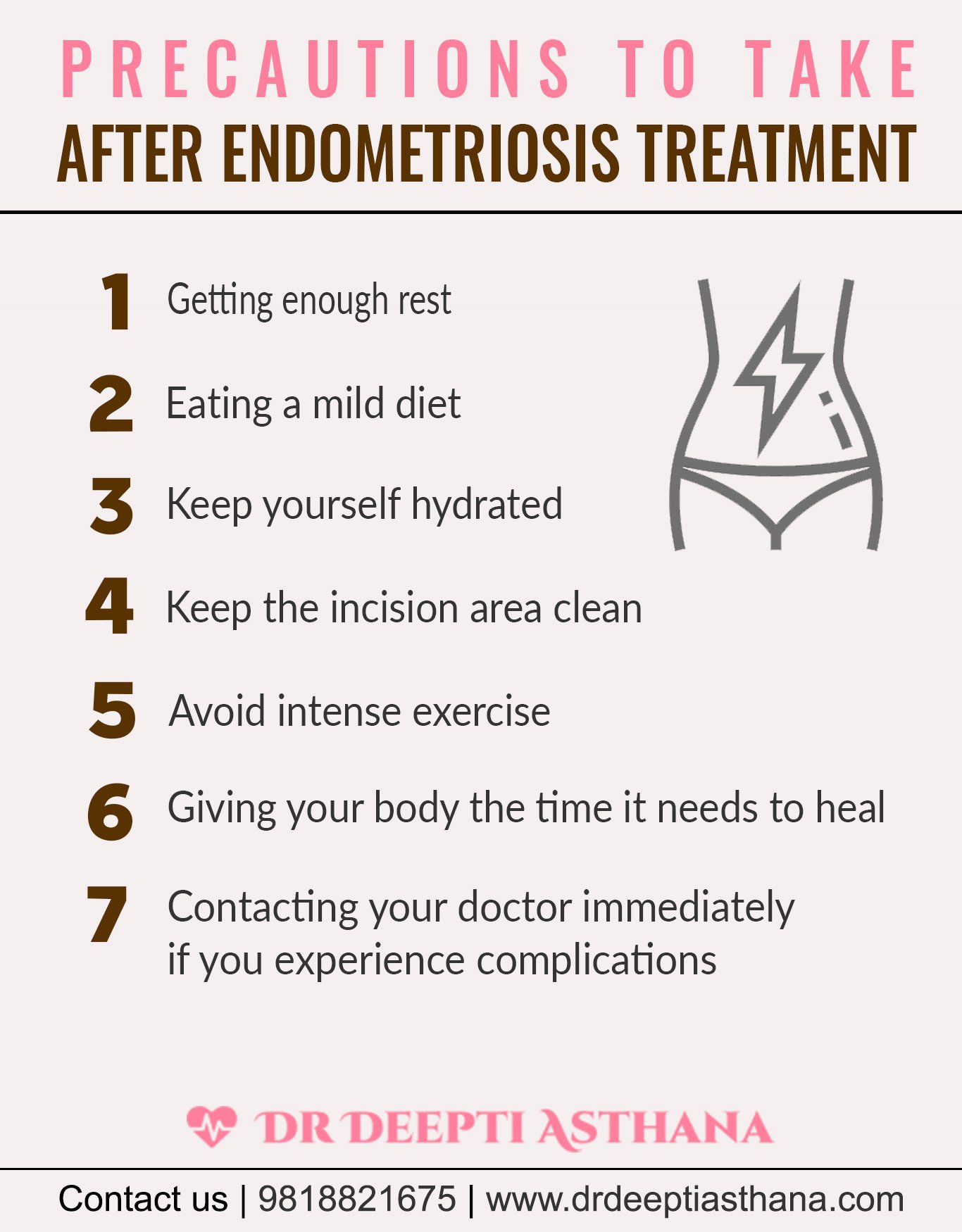
Endometriosis Treatment Doctor
Posted By Dr. Deepti Asthana on 20-08-2024
Endometriosis, a typical female reproductive condition, affects about 6-10 percent of women of reproductive age across the world. This health condition often goes undiagnosed whereas the symptoms are usually noticeable during the reproductive years of a woman.
Table of Contents
Feel free to skip ahead if one topic catches your eye:
- What is endometriosis?
- Stages of Endometriosis
- Most Common Signs and Symptoms
- Causes of Endometriosis
- How is it Diagnosed?
- Treatment Options
1. What is endometriosis?
Endometriosis is a female reproductive disorder that can be defined as the abnormal growth of endometrial cells that are quite similar to uterine cells, but in a different location than the uterus. The endometrial tissue starts growing in the bowel, ovaries, and tissues lining the pelvis. Rarely, The endometrial tissue might spread beyond the pelvic region.
The hormonal changes stimulated by menstrual cycles may affect the ectopic tissue, which causes pain and inflammation. In other words, the endometrial tissue will grow, thicken, and break down over a while. The broken tissue has nowhere to go and ends up getting trapped in the pelvis and this may cause scar formation, irritation, fertility problems, severe pain during menstrual cycles, and adhesions.
2. Stages of Endometriosis
The female reproductive disorder is classified into four stages (I-minimal, II-mild, III-moderate, and IV-severe). This classification is based upon the extent, depth, and location of the endometriosis implants. The classification is also dependent on the severity and presence of scar tissue as well as the size and presence of the endometrial tissue in the ovaries.
- Stage 1: There are minor wounds or lesions, and shallow endometrial implants on the ovary. It may or may not be characterised by inflammation in or around the pelvic cavity.
- Stage 2: It involves shallow implants and light lesions on the pelvic lining and the ovary.
- Stage 3: It may or may not involve lesions but is characterised by deep implants on the pelvic lining and the ovary.
- Stage 4: It involves deep implants on the ovaries and pelvic lining, with or without lesions on the bowels and fallopian tubes.

3. Most Common Signs and Symptoms
The most common signs and symptoms of endometriosis include:
- Pelvic pain
- Painful menstrual cycles
- discomfort with bowel movements
- pain or discomfort during sexual intercourse
- Lower abdomen pain or cramps before and during menstruation
- Irregular or heavy menstruation
Risk Factors For Developing Endometriosis:
- Starting of periods at an early age
- Never giving birth
- Low body mass index
- Reproductive tract abnormalities
- Family history of endometriosis
- Greater lifetime exposure to naturally-produced estrogen
- Heavy menstruation that lasts more than seven days
- Short menstrual cycles - for example, less than 27 days
4. Causes of Endometriosis
The exact cause of this common gynecological condition is unknown. One theory is that the retrograde flow of menstrual debris through the fallopian tubes into the abdominal and pelvic cavities is responsible for deposits of the endometrial tissue in unusual locations.
Another possibility is the thinning of the lining of other tissue forms such as the endometrium. It is also possible that the endometrial cells may get attached to a surgical incision after a C-section or hysterectomy.
5. How is it Diagnosed?
Effective treatment of endometriosis requires an accurate diagnosis.
For this, the best doctor for endometriosis treatment in Gurgaon may recommend one or more of the following tests:
Detailed history
The endometriosis specialist in Gurgaon will note down your family or personal history and ask you about the symptoms. Thereafter, a general health assessment may be done for determining if there are any likely signs of long-term health complications.
Physical exam
The doctor will be manually feeling your abdomen during a pelvic examination for scars or cysts behind the uterus.
Ultrasound/MRI
The doctor may use an abdominal ultrasound or a transvaginal ultrasound to access images of the reproductive organs to possibly identify cysts related to endometriosis.
CA 125
The doctor may recommend a Cancer antigen 125 (CA-125) blood test for measuring the count of CA-125 in the bloodstream.
Laparoscopy
It is the most accurate and definite way to diagnose endometriosis. The doctor would view endometriosis directly through laparoscopy, a minor surgical procedure. Once diagnosed, the surgeon can remove the tissue in the same procedure.
Access the best treatment from top endometriosis in Gurgaon at the right cost of endometriosis treatment in Gurgaon now!
6. Treatment Options
The doctor may recommend surgical or medical procedures depending on your medical case's severity and overall health.
Medical Management
Medical management of Endometriosis may include pain medications such as NSAIDs, and hormonal therapy for endometriosis to treat pain and discomfort. This may include the use of hormonal contraceptives, progestin therapy, aromatase inhibitors, and gonadotropin-releasing hormone (Gn-RH) agonists and antagonists.
The doctor and his or her team would carefully assess your medical conditions and review your health reports before deciding on the best treatment procedure. This comprehensive medical management analysis plays a big role in ensuring successful treatment and quick healing.
Laparoscopy: During this medical procedure, the surgeon makes use of an instrument for slightly inflating the abdomen with a gas and then inserting a laparoscope, a small instrument, into the abdomen through a small cut to view the growths. The surgeon may use techniques such as excision or cauterisation to remove or destroy the lesions along with removing the scar tissue.
Laparotomy: During this surgical procedure, the surgeon removes the endometriosis patches. It is usually performed as a last resort for treating endometriosis.
Hysterectomy: The surgeon will remove the uterus during this procedure. The surgeon may also remove the fallopian tubes and ovaries along with the uterus if the damage is severe or if the ovaries have endometriosis on them. It is usually recommended to women who don't have any plans to have children in the future and when symptoms don't go away despite other forms of treatment.
Takeaway
There is no denying the fact that endometriosis is a painful condition that can severely impact your quality of life. Still, you can always approach the best doctor for endometriosis treatment in Gurgaon for any treatment assistance related to endometriosis in Gurgaon.
At Kalosa Clinic, you will get the best advice and treatment from Dr. Deepti Asthana, who is a reputed and successful endometriosis specialist in Gurgaon. If you are looking for the best endometriosis treatment in Gurgaon, it is time you reach out to us now. Our team will be happy to guide you with the treatment options at a budget-friendly cost of endometriosis treatment in Gurgaon.